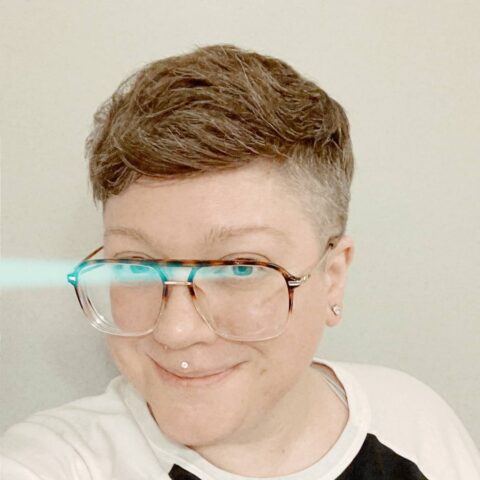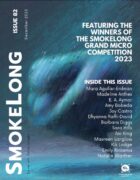What was the impetus for and process of your story?
The impetus for this story really came from the first line living rent free in my head for a few weeks. It started as a longer, then much shorter, then longer again piece in second-person point of view, and over the course of probably six months, worked its way to its current state. Telling this required a level of vulnerability that I sometimes struggle with when pulling from my own history, and I think it wasn’t until I changed to the first-person perspective that it really felt “right” and ready.
In addition to writing, you’re also a visual artist. Did one come before the other? If this narrative was instead a piece of visual art, what materials would you choose?
Visual art came first, only because it’s what I learned to do first—I was always drawing as a kid, but I’m more confident in my ability to show a story as a writer than I am as a visual artist.
I really love this question! I think I have to try and create this now, and it will have to be a mixed media piece, very textural and three dimensional: wood shavings, fabric, probably some sand and wire, paint and glue, ink for the finer bits.
You characterize the speaker by their habit of falling for women whose histories are different from the speaker’s. And the one exception—a woman who does share the same background—is quickly followed by the usual type. Was this pattern already in your first draft, or did you come to it during revision?
This pattern was always there, but it didn’t refine until the last draft. I think we have this feeling sometimes that if we can just find someone who has a similar past or set of experiences, that we’ll be understood, and that’s not always true. Or occasionally worse, they do and that can be such an uncomfortable mirror to look into.
What inspires you to create, and what is your ideal environment in which to create?
Everything. I’m very much a lightning-strike artist regardless of medium and nearly anything can spark a story, though I wouldn’t say that is especially reliable, and I have some years-long dry spells in the past. However, I think having made queerness my creative home, plus having deliberately abandoned the pursuit of perfection, inspiration is closer at hand than ever before.
My best internal environment for writing is when I have a strong sense of community and am challenged by guardrails, like prompts, for example. Because a guardrail is a rule, and it’s really satisfying to technically meet the letter of a rule but know that you bent it almost to breaking.
Can you talk about how your years-long dry spell ended?
I started working with a critique group again. For me, being in community with writers is so important. I don’t actually create well from within the vacuum of my own mind; getting back into a regular feedback cycle was the first step. The next one was getting back into regular workshopping (shameless SmokeLong Fitness plug). The challenge, variation, and accountability help me a lot.



 The core workshop of SmokeLong Fitness is all in writing, so you can take part from anywhere at anytime. We are excited about creating a supportive, consistent and structured environment for flash writers to work on their craft in a community. We are thrilled and proud to say that our workshop participants have won, placed, or been listed in every major flash competition. Community works.
The core workshop of SmokeLong Fitness is all in writing, so you can take part from anywhere at anytime. We are excited about creating a supportive, consistent and structured environment for flash writers to work on their craft in a community. We are thrilled and proud to say that our workshop participants have won, placed, or been listed in every major flash competition. Community works.